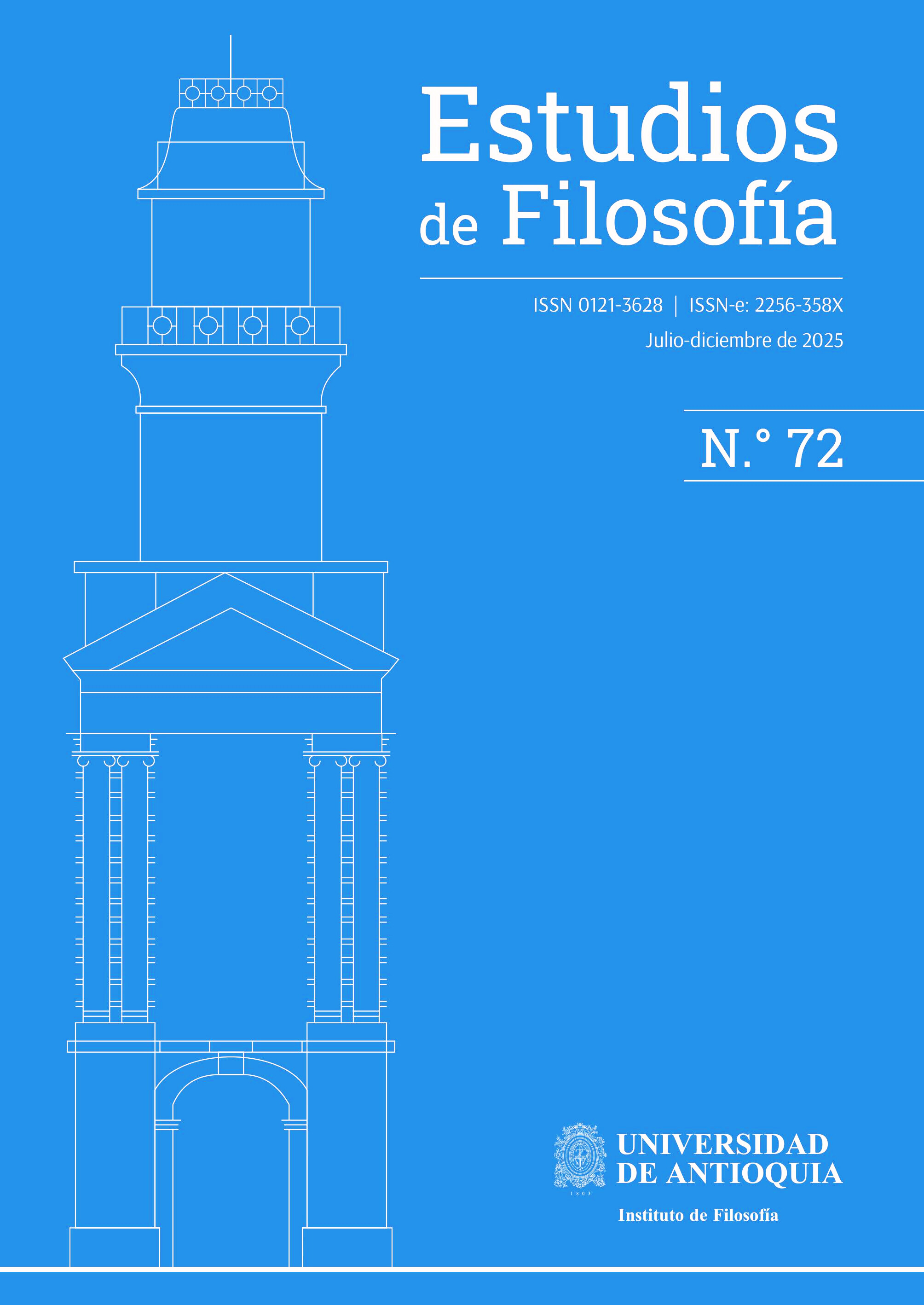Theoretical change and historical semantics
DOI:
https://doi.org/10.17533/udea.ef.357228Keywords:
Incommensurability, Pablo Melogno, Theoretical Change, Hybrid Theories of Reference, Historical SemanticsAbstract
In several academic studies, Pablo Melogno lays the groundwork for formulating election rational criteria between incommensurable theories, seeking to reconcile the Kuhnian notion of incommensurability with rationalist reconstructions of the processes of theoretical change. One of the axes of this project focuses on the semantic aspects of incommensurability. Particularly in the development of historical semantics that relativizes the scope of semantic holism. In this analysis, I deepen and extend Melogno’s project by considering various aspects of hybrid theories of reference.
Downloads
References
Borge, B. (2017). ¿Soluciona el descriptivismo causal el problema de la referencia de los términos teóricos? Ideas y Valores, 66(163), pp. 125-151. https://doi.org/10.15446/ideasyvalores.v66n163.49743
Frege, G. (1952). On sense and reference. En P. Geach & M. Black (Eds.), Translations from the Philosophical Writings of Gottlob Frege. Blackwell. (Trabajo original publicado en 1892).
Jackson, F. (1998). Reference and description revisited. Noûs, 32(S12), pp. 201-218. https://doi.org/10.1111/0029-4624.32.s12.9
Jackson, F. (2011). Language, names, and information. John Wiley & Sons. https://doi.org/10.1002/9781444325362
Kitcher, P. (1993). The Advancement of Science. Oxford University Press.
Kripke, S. (1980). Naming and Necessity. Harvard University Press. (Conferencias originales dadas en 1972). https://doi.org/10.1007/978-94-010-2557-7_9
Kroon, F. W. (1987). Causal descriptivism. Australasian Journal of Philosophy, 65(1), pp. 1-17. https://doi.org/10.1080/00048408712342731
Lewis, D. (1984). Putnam’s paradox. Australasian Journal of Philosophy, 62(3), pp. 221-236. https://doi.org/10.1080/00048408412340013
Loar, B. (1976). The semantics of singular terms. Philosophical Studies, 30(6), pp. 353-377. https://doi.org/10.1007/BF00372537
Melogno, P. (2014). Elección racional entre inconmensurables (I): Condiciones iniciales. En P. Melogno (Comp.). Cambio conceptual y elección de teorías (pp. 149-172). FIC-UdelaR.
Melogno, P. (2016). Elección racional entre inconmensurables (II): Cambio de significado. En P. Melogno (Comp.). Perspectivas sobre el lenguaje científico (pp. 57-70). FIC-UdelaR/Índice Grupo Editorial.
Melogno, P. (2020). Interpretación, traducción y comunicación, variedades de la inconmensurabilidad. SCIO: Revista de Filosofía, (18), pp. 87-111. https://doi.org/10.46583/scio_2020.18.697
Melogno, P. (2021). El cambio perceptual en la revolución química: Una revisión crítica. Epistemología e Historia de la Ciencia, 5(2), pp. 64-81. https://revistas.unc.edu.ar/index.php/afjor/article/view/30639
Psillos, S. (1999). Scientific Realism: How Science Tracks Truth. Routledge. https://doi.org/10.4324/9780203979648
Psillos, S. (2012). Causal descriptivism and the reference of theoretical terms. En A. Raftopoulos & P. Machamer (Eds.). Perception, Realism, and the Problem of Reference (pp. 222-244). Cambridge University Press. https://doi.org/10.1017/CBO9780511979279.010
Putnam, H. (1975). The meaning of meaning. En A. Danto (Ed.). Philosophical Papers, Vol. II: Mind, Language, and Reality (pp. 215-271). Cambridge University Press. https://doi.org/10.1017/CBO9780511625251.014
Raatikainen, P. (2007, 15-17 de noviembre). Theories of reference and the philosophy of science. [Presentación de conferencia]. EPSA07: 1st Conference of the European Philosophy of Science Association, Madrid.
Russell, B. (1911). Knowledge by acquaintance and knowledge by description. Proceedings of the Aristotelian Society, 11, pp. 108-128. https://doi.org/10.1093/aristotelian/11.1.108
Searle, J. (1958). Proper names. Mind, 67(266), pp. 166-173. https://doi.org/10.1093/mind/LXVII.266.166
Serebrinsky, D., & Borge, B. (2021). Términos teóricos y teorías híbridas de la referencia. Revista de Humanidades de Valparaíso, (17), pp. 169-191. https://doi.org/10.22370/rhv2021iss17pp169-191
Downloads
Published
How to Cite
Issue
Section
Categories
License
Copyright (c) 2024 Bruno Borge

This work is licensed under a Creative Commons Attribution-NonCommercial-ShareAlike 4.0 International License.
Authors who publish with this journal agree to the following terms:
1. The Author retains copyright in the Work, where the term "Work" shall include all digital objects that may result in subsequent electronic publication or distribution.
2. Upon acceptance of the Work, the author shall grant to the Publisher the right of first publication of the Work.
3. The Author shall grant to the Publisher a nonexclusive perpetual right and license to publish, archive, and make accessible the Work in whole or in part in all forms of media now or hereafter known under a Creative Commons Attribution-NoCommercia-ShareAlike (CC BY-NC-SA 4.0), or its equivalent, which, for the avoidance of doubt, allows others to copy, distribute, and transmit the Work under the following conditions: (a) Attribution: Other users must attribute the Work in the manner specified by the author as indicated on the journal Web site;(b) Noncommercial: Other users (including Publisher) may not use this Work for commercial purposes;
4. The Author is able to enter into separate, additional contractual arrangements for the nonexclusive distribution of the journal's published version of the Work (e.g., post it to an institutional repository or publish it in a book), as long as there is provided in the document an acknowledgement of its initial publication in this journal;
5. Authors are permitted, and Estudios de Filosofía promotes, to post online the preprint manuscript of the Work in institutional repositories or on their Websites prior to and during the submission process, as it can lead to productive exchanges, as well as earlier and greater citation of published work (see The Effect of Open Access). Any such posting made before acceptance and publication of the Work is expected be updated upon publication to include a reference to the Estudios de Filosofía's assigned URL to the Article and its final published version in Estudios de Filosofía.
10.17533/udea.ef.359373















